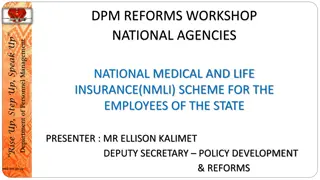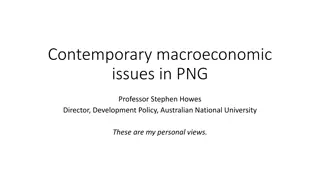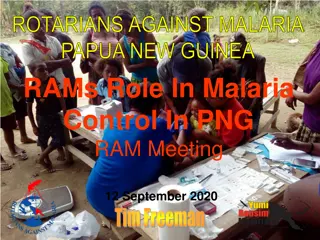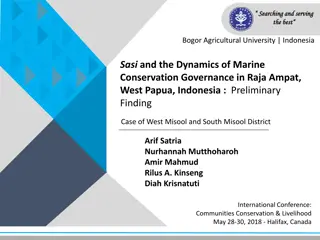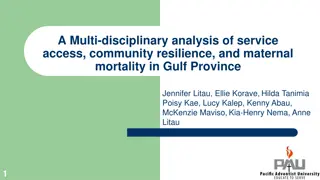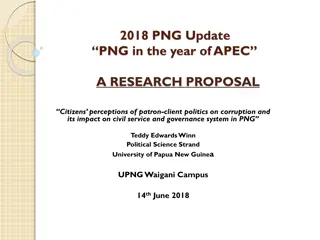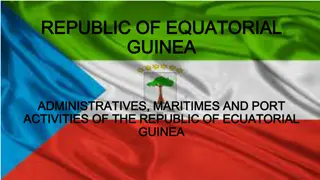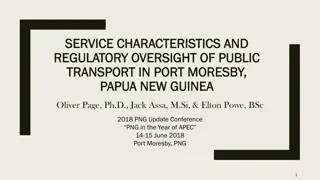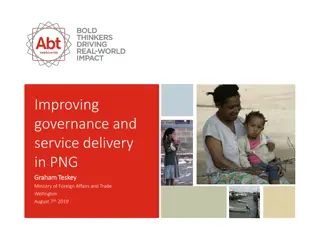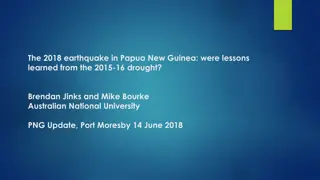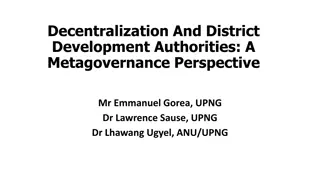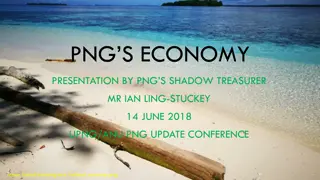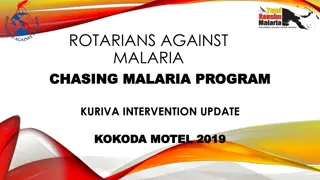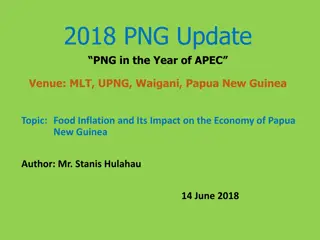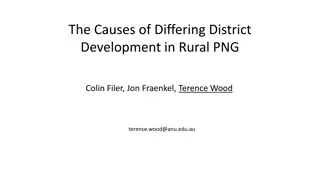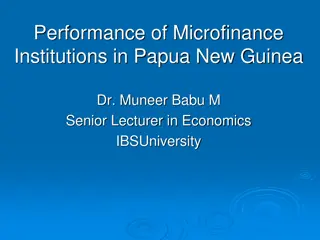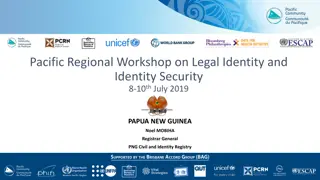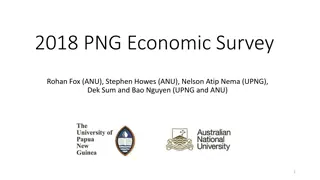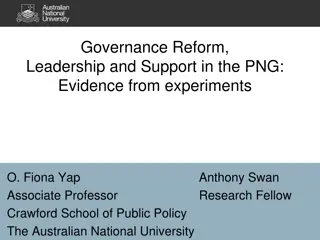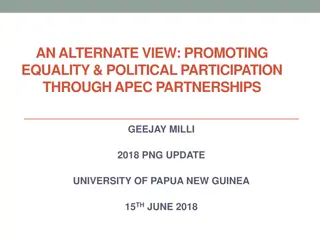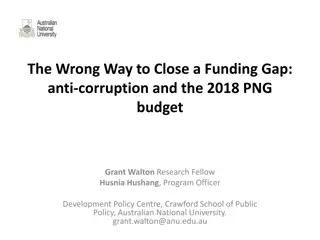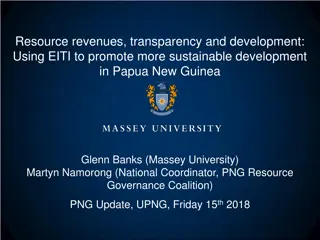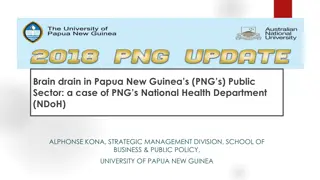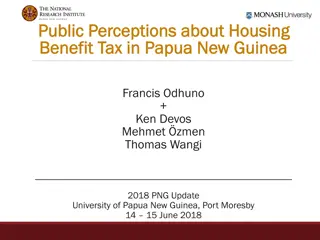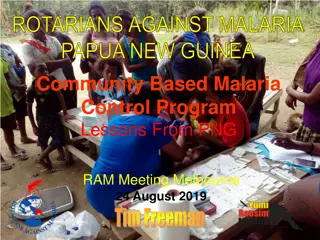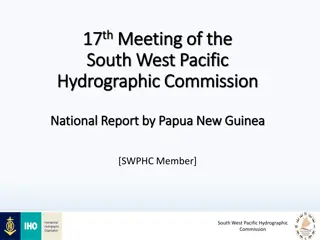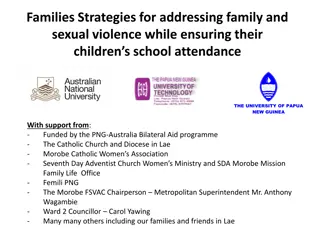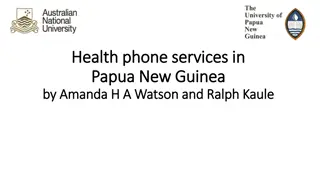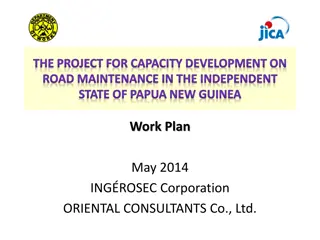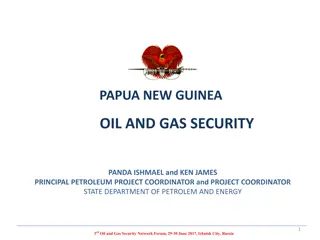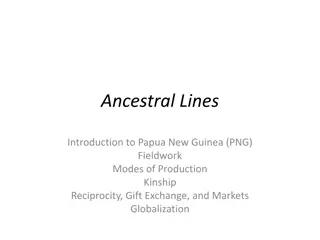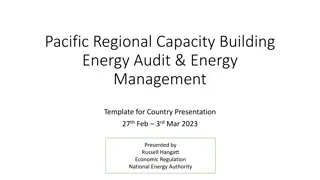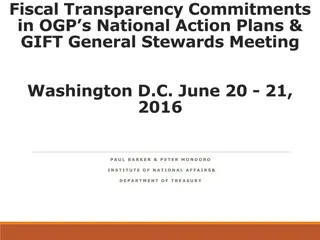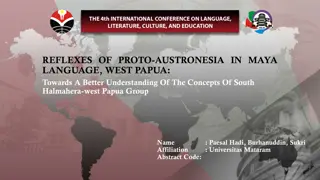Overview of HRDSP 30-Year Plan for Public Service Workforce Development in Papua New Guinea
This overview showcases the HRDSP initiative in Papua New Guinea, a 30-year plan aimed at developing a value-oriented public service workforce. Launched in April 2021, the plan is guided by principles such as honesty, integrity, and accountability. It addresses key areas like public sector reforms,
1 views • 15 slides
Rise Up, Step Up, Speak Up: DPM Reforms Overview
The Department of Personnel Management (DPM) in Papua New Guinea is undergoing significant reforms to enhance the public service workforce, address issues such as aging staff and inefficiencies, and modernize employment terms. The initiatives include health and life insurance policies, a national ho
0 views • 14 slides
National Medical and Life Insurance Scheme for PNG Public Servants: Overview and Implementation Progress
The Department of Personnel Management in Papua New Guinea is working on establishing a National Medical and Life Insurance Scheme for public servants, including leaders. The scheme aims to provide essential coverage in light of the COVID-19 pandemic and past NEC decisions. Progress includes approva
0 views • 19 slides
Analysis of Contemporary Macroeconomic Issues in Papua New Guinea
Professor Stephen Howes, Director of Development Policy at Australian National University, presents his personal views on macroeconomic issues in Papua New Guinea. The focus is on the exchange rate regime and its management, excess liquidity, and fiscal policy. Various economic indicators point to c
1 views • 48 slides
Challenges in the Rice Value Chain in Guinea
Guinea faces various challenges in its rice value chain despite being a significant producer. The country's production has increased, but it still struggles to meet domestic demand, leading to substantial rice imports. Rice cultivation is vital for Guinea's socio-economic development, with over 80%
6 views • 19 slides
Gender Equity and Social Inclusion Policy Overview
This overview highlights the Gender Equity and Social Inclusion (GESI) Policy promoted by the Department of Personnel Management in Papua New Guinea. The policy aims to ensure fair participation of disadvantaged individuals in employment and opportunities, along with social inclusion to realize the
1 views • 18 slides
Unlocking Mini Grids for Sustainable Development in Papua New Guinea: Business Models & Challenges
Papua New Guinea has ambitious targets for electricity access, electrification, and climate action. The government aims to achieve universal electricity access by 2050, with specific goals to increase access rates and renewable energy penetration. Initiatives like the Rural Electrification Program f
3 views • 27 slides
Role of ROTARIANS AGAINST MALARIA (RAM) in Malaria Control in Papua New Guinea
ROTARIANS AGAINST MALARIA (RAM) plays a crucial role in malaria control in Papua New Guinea through various programs like net distribution, health facility supervision, and drug distribution. Funding from sources like the Global Fund, Against Malaria Foundation, and sustainable initiatives ensures t
0 views • 36 slides
Marine Conservation Governance in Raja Ampat, West Papua, Indonesia
Explore the dynamics of marine conservation governance in Raja Ampat, West Papua, Indonesia, with a focus on Sasi practices and the preliminary findings in the West Misool and South Misool districts. Discover the potential resources in Raja Ampat and the various types of marine conservation areas in
0 views • 22 slides
A Multi-disciplinary Analysis of Service Access, Community Resilience, and Maternal Mortality in Gulf Province
This paper presents a comprehensive analysis focusing on service access, community resilience, and maternal mortality in Gulf Province, Papua New Guinea. It highlights the importance of improving referral systems for maternal health in remote communities and discusses the preliminary findings from a
1 views • 53 slides
Perceptions of Patron-Client Politics on Corruption in Papua New Guinea: A Research Proposal
Investigate the impact of patron-client politics on corruption in PNG to understand its effects on civil service and governance. Analyze traditional and modern systems to identify prevailing patronage types and their influence on corruption. The study aims to redefine corruption in the PNG context f
0 views • 24 slides
Maritime and Geographical Overview of Equatorial Guinea
Equatorial Guinea, a country in central Africa, boasts a significant maritime presence and strategic geographical location in the Gulf of Guinea. With a population of over 1.2 million, it shares borders with Cameroon and Gabon while having maritime boundaries extending 320 nautical miles. The countr
0 views • 15 slides
Public Transport Service Characteristics in Port Moresby, Papua New Guinea
This study delves into the public transport service characteristics and regulatory oversight in Port Moresby, the capital city of Papua New Guinea. It covers the historical timeline, vehicle types, population, permits, and ownership details of public transportation in the city. The objective is to i
0 views • 16 slides
Enhancing Governance and Service Delivery: Insights from PNG Australia Governance Partnership
This presentation discusses the governance landscape in Papua New Guinea (PNG) with a focus on service delivery reform. It covers the methodology, findings, and implications of the PNG Australia Governance Partnership, highlighting key aspects such as country comparators, data collection, and assess
0 views • 20 slides
Lessons Learned from Papua New Guinea's 2015-16 Drought in Dealing with the 2018 Earthquake
Exploring the correlation between the 2015-16 drought and the 2018 earthquake in Papua New Guinea offers valuable insights into disaster management strategies. Comparisons in impact, response, and long-term consequences highlight the importance of proactive measures and effective coordination in mit
0 views • 15 slides
Decentralization and District Development Authorities: A Metagovernance Perspective
The study explores the impact of District Development Authorities (DDAs) on Papua New Guinea's decentralized governance system. It focuses on metagovernance issues such as coordination, leadership, and conflict resolution within the decentralized framework. The introduction, approach, and analysis p
0 views • 14 slides
Challenges and Opportunities in PNG's Economy Presentation
The presentation by PNG's Shadow Treasurer, Mr. Ian Ling-Stuckey, highlights the current economic situation and development experiences in Papua New Guinea. It discusses issues such as poor social indicators, the resource curse, and the impact on APEC opportunities and job growth. The presentation a
0 views • 20 slides
Chasing Malaria Programme Updates & Interventions in Papua New Guinea
The Chasing Malaria Programme, funded by Rotarians Against Malaria, focuses on mapping and addressing malaria in Central and NCD Provinces in Papua New Guinea. It involves distributing Long Lasting Insecticidal Nets (LLINs) to areas with malaria cases and collaborating with local communities to comb
0 views • 22 slides
Food Inflation and Its Impact on Papua New Guinea's Economy
Understanding the challenges of food inflation and its impact on consumers and the economy in Papua New Guinea is crucial. Despite GDP growth, the country still faces issues due to high demand for food and limited domestic production. Import dependency and insufficient domestic food industry hinder
1 views • 19 slides
Exploring Variations in Rural District Development Factors
The causes of differing district development in rural Papua New Guinea (PNG) are investigated, highlighting various factors influencing development outcomes such as natural endowments, colonial history, social institutions, and ethno-linguistic fragmentation. Preliminary findings suggest that social
4 views • 8 slides
Efficiency Analysis of Microfinance Institutions in Papua: A Study by Dr. Muneer Babu
Analysis of the performance and efficiency of Microfinance Institutions in Papua New Guinea, focusing on the provision of financial services to the underbanked population. The study evaluates the resource utilization and efficiency of MFIs, comparing less efficient and highly efficient institutions.
0 views • 18 slides
Overview of Civil Identity Registry System in Papua New Guinea
The Civil Identity Registry System in Papua New Guinea, established by an Act of Parliament in 1963 and amended in 2014, plays a crucial role in maintaining records for births, marriages, adoptions, divorces, and deaths. The system faces challenges with data sharing due to legislation constraints. T
0 views • 27 slides
2018 PNG Economic Survey: Analysis and Recommendations
The 2018 PNG Economic Survey conducted by a team of experts highlights the challenges faced by the non-resource economy in Papua New Guinea. The report emphasizes the need for policy actions to stimulate growth, address foreign exchange shortages, and boost employment. Data indicates a recession in
0 views • 44 slides
Governance Reform and Leadership Support in PNG: Insights from Experiments
This research delves into the conditions under which citizens support governance reform and take up leadership roles to garner broad support for reform in Papua New Guinea. It highlights the significance of citizen demand and government supply of reforms, addressing the implications of individual ch
1 views • 18 slides
Promoting Gender Equality and Political Participation in Papua New Guinea through APEC Partnerships
The presentation delves into the background of women's political participation in Papua New Guinea, highlighting the low representation of women in politics. It explores the potential role of APEC in fostering greater gender equality and political involvement in the region. The briefing also emphasi
3 views • 20 slides
Analysis of Anti-corruption Funding Discrepancies in the 2018 PNG Budget
The study examines the funding allocation and actual spending for anti-corruption organizations in the 2018 budget of Papua New Guinea, highlighting decreases in funding for crucial entities like FIU/FASU, Fraud Squad, ICAC, and Auditor General over the years, raising concerns about the government's
0 views • 24 slides
Seasonal Worker Programs in Australia and New Zealand: Challenges and Opportunities
Seasonal worker programs in Australia and New Zealand play a crucial role in benefiting workers, employers, and economies. However, Papua New Guinea faces challenges in accessing these opportunities due to factors like urban bias and limited employer interest. Strategies to increase PNG's participat
0 views • 14 slides
Utilizing EITI for Sustainable Development in Papua New Guinea
Discussing the importance of the Extractive Industries Transparency Initiative (EITI) in promoting sustainable development in Papua New Guinea by enhancing transparency and accountability in the extractives sector. The presentation covers the overview of EITI, challenges, understanding revenue flows
0 views • 12 slides
Addressing Brain Drain in Papua New Guinea's Public Sector: A Focus on the National Health Department
Brain drain in Papua New Guinea's National Health Department (NDoH) is impacting the retention of health professionals due to uncompetitive conditions, lack of equipment, and cultural factors. This article explores the causes and proposes solutions such as increasing salaries, providing necessary eq
0 views • 9 slides
Public Perceptions of Housing Benefit Tax in Papua New Guinea
The research conducted at the University of Papua New Guinea in 2018 focused on the public perceptions surrounding housing benefit tax in the country. The study highlighted changes in taxable values of employer-provided housing, justifying tax adjustments, tax measures introduced in budget documents
0 views • 16 slides
Lessons Learned from Rotarians Against Malaria Program in Papua New Guinea
Community-based malaria control program undertaken by Rotarians Against Malaria in Papua New Guinea focused on chasing malaria hotspots through various strategies like using Long Lasting Insecticidal Nets (LLINs) and mapping malaria cases. The program aims to replicate its success in other partner c
0 views • 31 slides
Hydrographic Development Progress in Papua New Guinea
The National Maritime Safety Authority (NMSA) in Papua New Guinea has made significant strides in hydrographic development, including expanding staff, initiating capacity-building programs, conducting surveys, charting efforts, and enhancing Maritime Safety Information (MSI) capabilities. Challenges
0 views • 6 slides
Strategies for Addressing Family and Sexual Violence Impact on Children's School Attendance in PNG
This research project, conducted by a diverse interdisciplinary team from the University of Papua New Guinea, explores the strategies employed by families in urban PNG to tackle family and sexual violence while ensuring their children's school attendance. By engaging with community perspectives and
0 views • 18 slides
Telehealth Services in Papua New Guinea: A Study by Amanda H.A. Watson and Ralph Kaule
Telehealth services in Papua New Guinea, as studied by Watson and Kaule, involve phone consultations and nonphysician services like telenursing. Interviews conducted in Port Moresby, provincial towns, and rural health facilities revealed insights on the interviewee demographics, work experience, and
0 views • 20 slides
Capacity Development on Road Maintenance in Papua New Guinea - Project Overview
This project aims to enhance the Department of Works' capacity in implementing gravel road maintenance through training and support activities. The project covers various provinces in Papua New Guinea and includes baseline surveys, training programs, and evaluations. Pilot project schedules are outl
0 views • 17 slides
Papua New Guinea Oil and Gas Industry Overview
Papua New Guinea (PNG) is a significant player in the oil and gas industry, with production of crude oil and LNG. The country's oil production began in 1991, while LNG production commenced in 2014. PNG has refining capabilities and both exports and imports petroleum products. The country has notable
1 views • 12 slides
Exploring Papua New Guinea: Fieldwork and Cultural Diversity
Delve into the rich cultural tapestry of Papua New Guinea through discussions on fieldwork modes of production, kinship, reciprocity, gift exchange, and markets. Gain insights into the unique challenges faced by rainforests in Amazon, Central Africa, and Southeast Asia, emphasizing their crucial rol
0 views • 6 slides
Energy Sector Development in Papua New Guinea: Progress and Initiatives
Papua New Guinea faces challenges in energy sector development due to its diverse geography and vast number of local languages. Efforts are being made to increase renewable energy sources, improve energy efficiency, and adopt international standards. The National Energy Authority plays a key role in
0 views • 9 slides
Overview of Papua New Guinea's Fiscal Transparency Commitments in OGP
Papua New Guinea (PNG) is actively engaging in the Open Government Partnership (OGP), with commitments to enhance fiscal transparency and accountability. PNG's journey towards OGP membership includes workshops, seminars, and the submission of a National Action Plan emphasizing budget formulation pro
0 views • 11 slides
Understanding Proto-Austronesian Reflexes in Maya Language of West Papua
Maya language, spoken by the Maya community in Waigeo Island, West Papua, is related to South Halmahera languages. This research aims to identify phonological features of Maya as part of this subgroup. Contradictory opinions exist regarding the concept of South Halmahera-West New Guinea. The study a
0 views • 7 slides


